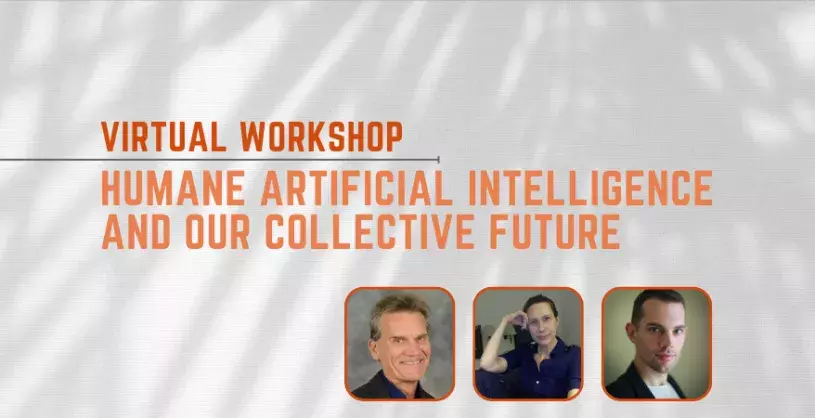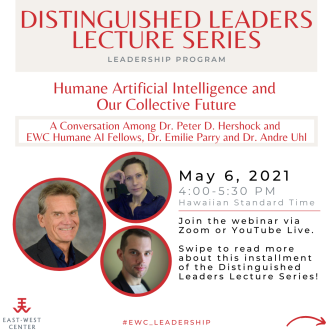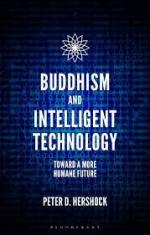Error message

OFFICE/DEPARTMENT

Machine learning, big data, and Artificial Intelligence are reshaping the human experience. As technology shatters previously foundational certainties and opens entirely new spaces of risk and opportunity, how can we think differently about attention and ethics?
This virtual workshop will feature a conversation among Dr. Peter Hershock, Director of EWC’s Asian Studies Development Program, and Dr. Andre Uhl and Dr. Emilie Parry, Fellows affiliated with the EWC’s Humane AI Initiative. This talk-story builds from Dr. Hershock’s recently-published book, Buddhism and Intelligent Technology: Toward a More Humane Future, and explores such questions as What are the potential benefits and perils of intelligent technologies? and What can individuals and communities do to counteract the capture and exploitation of our attention and the traces of our intelligent activity—our so-called data exhaust?
This event is relevant for anyone interested in gaining a nuanced perspective of intelligent technology, how we are both shaping and being shaped by it, and what that means for our collective future.
About the Buddhism and Intelligent Technology

From the Bloomsbury website: Rather than turning exclusively to cognitive science and contemporary ethical theories, Hershock shows how classical Confucian and Socratic philosophies help to make visible what a history of choices about remaking ourselves through control biased technology has rendered invisible. But it is in Buddhist thought and practice that Hershock finds the tools for valuing and training our attention, resisting the colonization of consciousness, and engendering a more equitable and diversity-enhancing human-technology-world relationship. Focusing on who we need to be present as to avoid a future in which machines prevent us from either making or learning from our own mistakes, Hershock offers a constructive response to the unprecedented perils of intelligent technology and seamlessly blends ancient and contemporary philosophies to envision how to realize its equally unprecedented promises.
About the Speakers
Peter Hershock is Director of the Asian Studies Development Program (ASDP) and Education Specialist at the East-West Center in Honolulu, Hawai'i. In his work with ASDP, he designs and directs higher education faculty and institutional development programs that seek to mainstream the study of Asian cultures and societies in the undergraduate classroom. In connection with his work in the Professional Development Program at the Center, he has collaborated in designing and hosting international education leadership programs and research seminars that critically examine the relationships among higher education, globalization, equity and diversity. Most recently, he has helped launch the Center’s initiative on Humane Artificial Intelligence, with a focus on the societal impacts and ethical issues raised by emerging technologies. Trained in Asian and comparative philosophy, his research and writing draw on Buddhist conceptual resources to reflect on and address contemporary issues of global concern.
Emilie Parry is founder of Rootbridge Ecosystems, and co-collaborator / researcher across networks of local, endogenous and Indigenous Peoples engaged around the climate crisis and ecological regeneration. She has bridged praxis, policy and research in the fields of New and Transitioning Markets, ‘Post-Growth’ Economies, social change movements, peace / conflict transformation and transitioning societies, humanitarian and complex emergencies, civilian / child protection, deep ecology, and disaster risk management – in Asia, the Americas, Africa, the UK and Eastern Europe. Emilie recently completed a doctoral-level research degree at the University of Oxford Centre for the Environment, School of Geography & the Environment, seated within the Environmental Change Institute. Her Master’s degree from Brandeis University’s Heller School of Social Policy & Management emphasized sustainable development and conflict transformation, conducted jointly with Harvard Kennedy School of Government and Harvard Law School (international rights law, dispute negotiation); Bachelor’s degree is a double major from the University of California at Berkeley in International Development Studies and English. She is a Humane AI fellow with the East West Center.
Andre Uhl is a Humane AI Fellow at the East West Center. His research explores the role of place-based knowledges for the responsible governance of emerging technologies, in particular with regard to deploying Artificial Intelligence in community-based climate action. Andre currently serves as the chair of the IEEE Earth Lab, executive member at the Council on Extended Intelligence (CXI), and technology and innovation fellow at the Planetary Health Alliance. Previously, he was as a reviewer at the Technology and Public Purpose Project at Harvard Kennedy School, founding co-chair of the Sustainable Peace Working Group at Harvard Divinity School, and research fellow at the MIT Dalai Lama Center for Ethics and Transformative Values. Andre is currently completing a PhD in Visual Studies at Harvard University. Previously, he received an MA in New Media from Tokyo University of the Arts under the ‘MEXT’ fellowship program of the Japanese Ministry of Education, Culture, Sports, Science and Technology, and a BA in East Asia Studies and Visual Studies from FU Berlin as a fellow of the German National Academic Foundation.
Watch the recorded live video!

Machine learning, big data, and Artificial Intelligence are reshaping the human experience. As technology shatters previously foundational certainties and opens entirely new spaces of risk and opportunity, how can we think differently about attention and ethics?
This virtual workshop will feature a conversation among Dr. Peter Hershock, Director of EWC’s Asian Studies Development Program, and Dr. Andre Uhl and Dr. Emilie Parry, Fellows affiliated with the EWC’s Humane AI Initiative. This talk-story builds from Dr. Hershock’s recently-published book, Buddhism and Intelligent Technology: Toward a More Humane Future, and explores such questions as What are the potential benefits and perils of intelligent technologies? and What can individuals and communities do to counteract the capture and exploitation of our attention and the traces of our intelligent activity—our so-called data exhaust?
This event is relevant for anyone interested in gaining a nuanced perspective of intelligent technology, how we are both shaping and being shaped by it, and what that means for our collective future.
About the Buddhism and Intelligent Technology

From the Bloomsbury website: Rather than turning exclusively to cognitive science and contemporary ethical theories, Hershock shows how classical Confucian and Socratic philosophies help to make visible what a history of choices about remaking ourselves through control biased technology has rendered invisible. But it is in Buddhist thought and practice that Hershock finds the tools for valuing and training our attention, resisting the colonization of consciousness, and engendering a more equitable and diversity-enhancing human-technology-world relationship. Focusing on who we need to be present as to avoid a future in which machines prevent us from either making or learning from our own mistakes, Hershock offers a constructive response to the unprecedented perils of intelligent technology and seamlessly blends ancient and contemporary philosophies to envision how to realize its equally unprecedented promises.
About the Speakers
Peter Hershock is Director of the Asian Studies Development Program (ASDP) and Education Specialist at the East-West Center in Honolulu, Hawai'i. In his work with ASDP, he designs and directs higher education faculty and institutional development programs that seek to mainstream the study of Asian cultures and societies in the undergraduate classroom. In connection with his work in the Professional Development Program at the Center, he has collaborated in designing and hosting international education leadership programs and research seminars that critically examine the relationships among higher education, globalization, equity and diversity. Most recently, he has helped launch the Center’s initiative on Humane Artificial Intelligence, with a focus on the societal impacts and ethical issues raised by emerging technologies. Trained in Asian and comparative philosophy, his research and writing draw on Buddhist conceptual resources to reflect on and address contemporary issues of global concern.
Emilie Parry is founder of Rootbridge Ecosystems, and co-collaborator / researcher across networks of local, endogenous and Indigenous Peoples engaged around the climate crisis and ecological regeneration. She has bridged praxis, policy and research in the fields of New and Transitioning Markets, ‘Post-Growth’ Economies, social change movements, peace / conflict transformation and transitioning societies, humanitarian and complex emergencies, civilian / child protection, deep ecology, and disaster risk management – in Asia, the Americas, Africa, the UK and Eastern Europe. Emilie recently completed a doctoral-level research degree at the University of Oxford Centre for the Environment, School of Geography & the Environment, seated within the Environmental Change Institute. Her Master’s degree from Brandeis University’s Heller School of Social Policy & Management emphasized sustainable development and conflict transformation, conducted jointly with Harvard Kennedy School of Government and Harvard Law School (international rights law, dispute negotiation); Bachelor’s degree is a double major from the University of California at Berkeley in International Development Studies and English. She is a Humane AI fellow with the East West Center.
Andre Uhl is a Humane AI Fellow at the East West Center. His research explores the role of place-based knowledges for the responsible governance of emerging technologies, in particular with regard to deploying Artificial Intelligence in community-based climate action. Andre currently serves as the chair of the IEEE Earth Lab, executive member at the Council on Extended Intelligence (CXI), and technology and innovation fellow at the Planetary Health Alliance. Previously, he was as a reviewer at the Technology and Public Purpose Project at Harvard Kennedy School, founding co-chair of the Sustainable Peace Working Group at Harvard Divinity School, and research fellow at the MIT Dalai Lama Center for Ethics and Transformative Values. Andre is currently completing a PhD in Visual Studies at Harvard University. Previously, he received an MA in New Media from Tokyo University of the Arts under the ‘MEXT’ fellowship program of the Japanese Ministry of Education, Culture, Sports, Science and Technology, and a BA in East Asia Studies and Visual Studies from FU Berlin as a fellow of the German National Academic Foundation.






